Publics Prioritize Disease Control Efforts Over Economic Re-opening
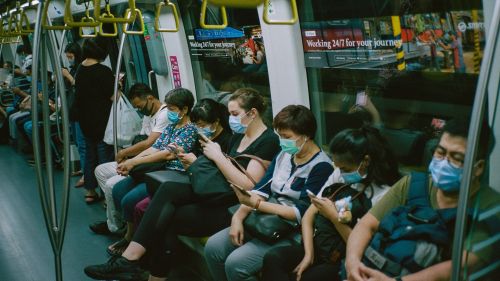
An update on global public opinion on COVID-19 reviews survey results from countries in North and South America, Europe, Asia, and Gulf States.
Global Public Opinion and the Coronavirus Weekly Update
As the coronavirus continues to spread globally, the world this week passed the 3 million case mark, with over 200,000 deaths attributed to COVID-19 so far. In general, publics around the world remain supportive of a range of policies designed to prevent the spread of coronavirus, including broad restrictions on personal movement. Publics under lockdowns and other states of emergency only want to lift the restrictions when it is safe to do so, prioritizing disease control efforts over economic re-opening.
This week, the Chicago Council Survey team’s update on global public opinion includes polling results from the United States, South Korea, the United Kingdom, Italy, France, Mexico, Brazil, and the Gulf States. We will continue to provide weekly updates on public opinion around the world on the COVID-19 pandemic.
Key Findings
- Fewer Americans now say they are self-quarantining (43%) than in the previous three weeks when at least half said they had done so.
- Brazilian attitudes toward President Bolsonaro’s management of the crisis is quickly souring as 45 percent say he has done a bad or terrible job, up from 38 percent the week before.
- By contrast, 73 percent of Mexicans say that President Andrés Manuel López Obrador has done a good job dealing with the pandemic, a notable shift from a month prior when only four in ten thought he had done enough to fight the disease.
- As Italy prepares to begin easing restrictions on movement and businesses, just over half of Italians (53%) think that the economy should be restarted even if the virus is not fully contained.
- As the French Prime Minister laid out the plan for easing lockdown restrictions, 62 percent of French people say that they are not confident in the success of this plan.
- Despite waning confidence in the British government’s handling of the coronavirus outbreak, the proportion of Britons who will wear face masks jumps from 51 percent to 74 percent if the government recommends it.
North and South America
United States
More than 50,000 people have now died of COVID-19 in the United States, with more than one million total cases reported thus far. While the growth of new cases and deaths has stabilized nationally, that stabilization has been uneven among states.
Throughout the course of the pandemic, American behaviors have changed dramatically, a change that Axios/Ipsos polling has tracked over the past six weeks. In mid-March, when the first wave of business closing and shelter-in-place orders began, only one in ten Americans (10%) said they had self-quarantined in the last week. For many, life seemed normal, with 56 percent saying they had gone out to eat, and half (48%) visiting friends or relatives. Since then, American behavior has changed dramatically. In the sixth and more recent wave of their polling, conducted April 17-20, only seven percent of Americans report having gone out to eat, and 19 percent visiting friends or relatives. Reaching a new high, six in ten (60%) say they have had a video call with friends or family, as Americans substitute digital means for in-person gatherings. The percentage who say they have self-quarantined has declined to 43 percent in the most recent numbers, a decline from at least half saying they had done so for the previous three weeks. And while some states have started easing restrictions, on a national level Americans are still concerned about moving too quickly. An April 15-20 Kaiser Family Foundation poll found that 80 percent of Americans say the stay at home measures are worth it to protect and limit the spread of the virus.
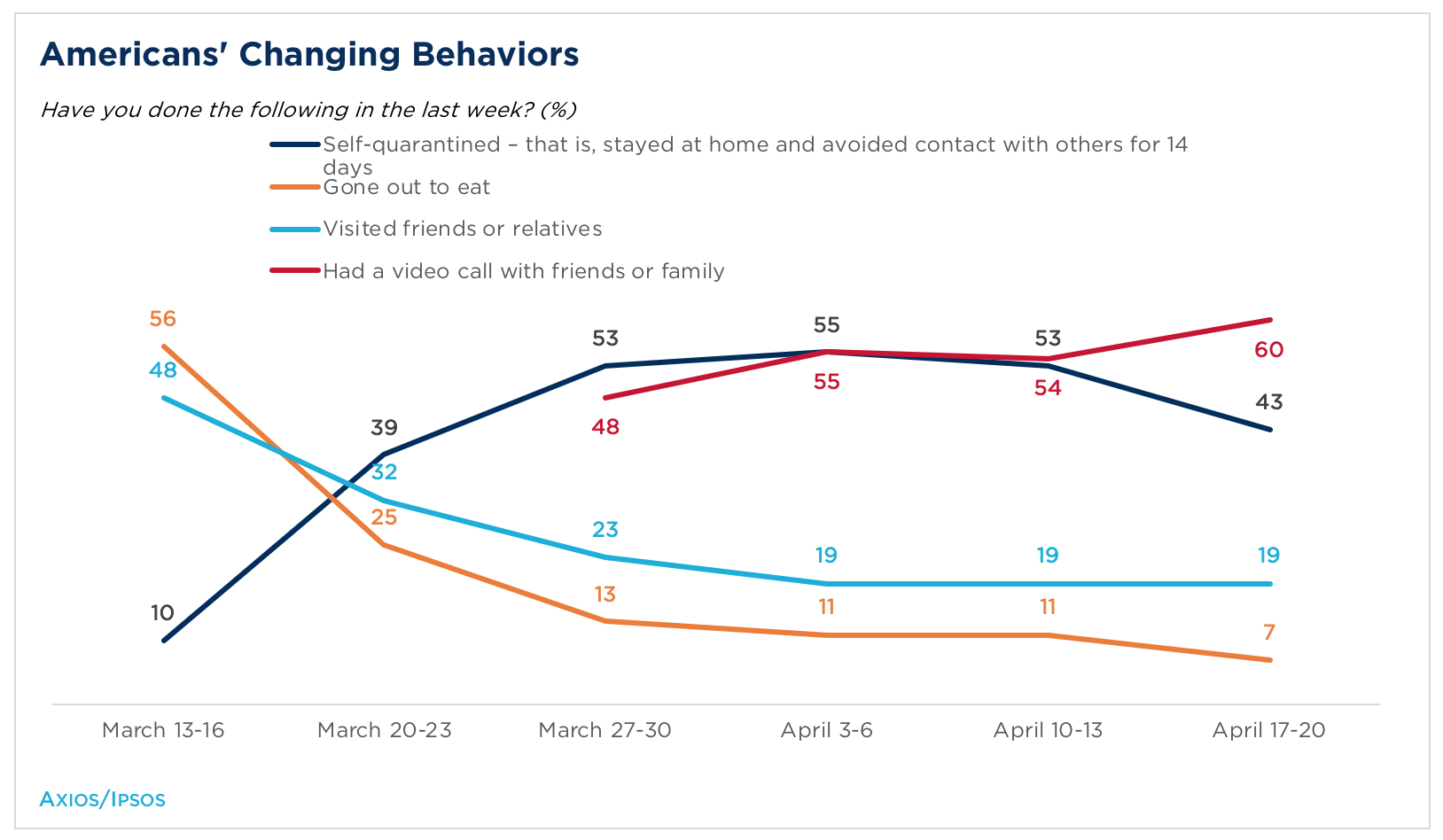
Another notable feature of the American response to the coronavirus pandemic is the division in approval between President Trump and state governors. We have previously covered this gap in national polling, which finds Americans rating "their state’s governor" highly. The same gap also appears in state-level polling. But while governors get a boost across the board, those governors who are more active in handling the crisis are also benefiting the most in higher approval ratings.
As the below figure shows, in recent polls of registered voters in Florida, Wisconsin, and Michigan, governors are consistently getting higher job approval marks than the President during this crisis. Governor Whitmer of Michigan has seen her approval rate rise to 63 percent, up from 43 percent in January. Governor Evers of Wisconsin has seen a similar ratings boost from 51 percent approval rating in February to 65 percent a month later. Florida Governor DeSantis has not seen the same jump in approval rating as other governors. Instead, his approval rate is lower now than before the crisis, when two-thirds of Florida voters approved of the job he was doing as governor. That may reflect some criticism of his handling of the outbreak: in contrast to other state governors, DeSantis was hesitant to issue a stay-at-home order, and his decision not to close Florida’s beaches to spring break partiers facilitated the spread of the disease throughout the state and the country.
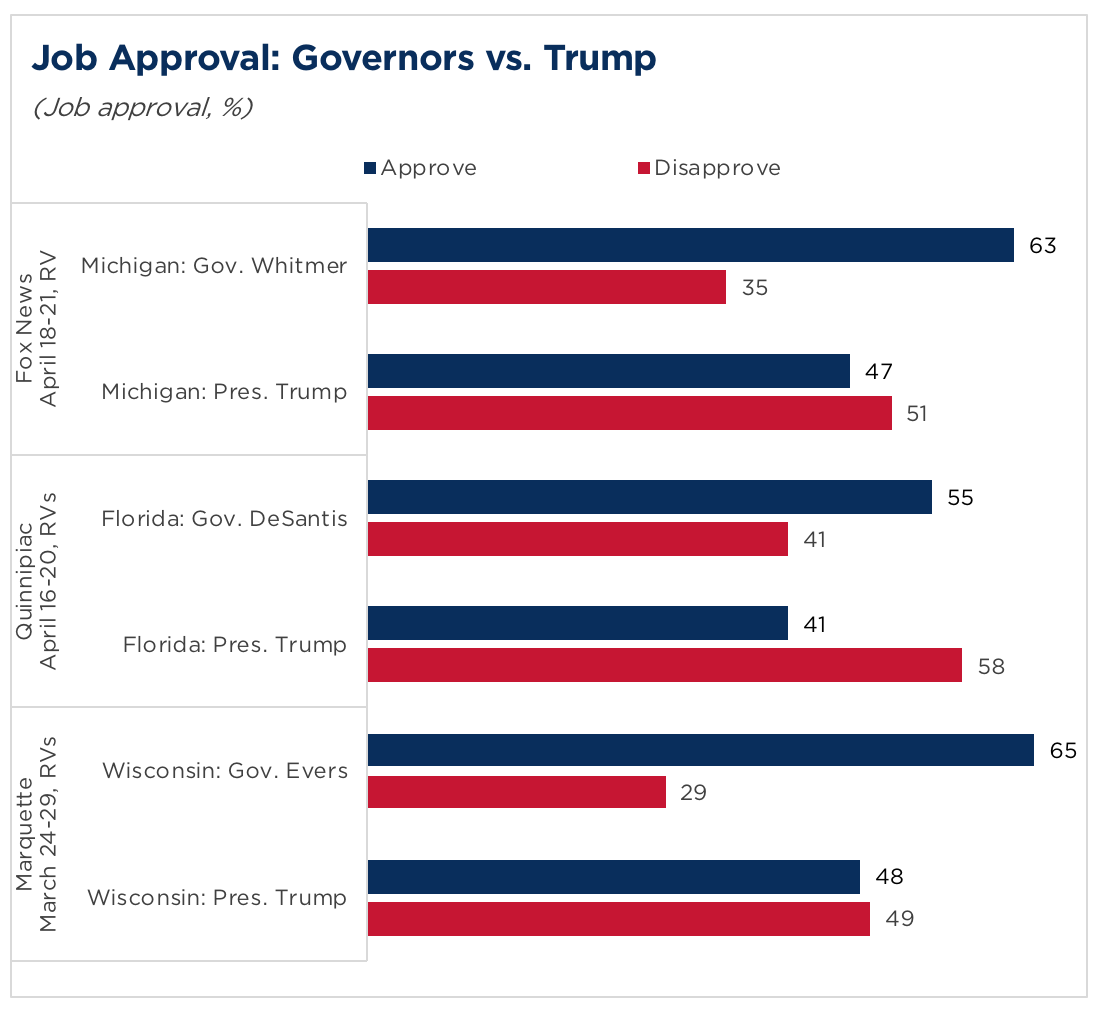
Canada
Canada’s coronavirus cases have continued to rise over the past week, surpassing the 50,000 mark despite broad compliance with social distancing orders. Nonetheless, Canada’s death toll of less than 3,000 is relatively low compared to other western nations.
Though Canadians report a broad willingness to stay at home to protect others, the latest Angus Reid poll shows that shutdown practices have taken a toll on Canadians’ mental health. Half (50%) of respondents say their mental health has worsened over the past six weeks, with 1 in 10 (10%) saying it has worsened "a lot."
The Canadian government has begun to roll out substantial financial assistance programs. Of those who have applied for government assistance, 94 percent say such programs have helped either a little (21%), a lot (35%), or are a total lifeline (38%). Though many Canadians may remain financially unstable for months to come, many continue to place health over economic concerns—77 percent think it is too soon to start lifting lockdown restrictions.
Mexico
Concern amongst the Mexican public is high with regard to their financial prospects in the immediate future. According to an April 17-21 survey conducted by Buendia y Laredo, 70 percent of Mexicans say that it is very or somewhat likely that their family income will decrease over the next four weeks, and 69 percent say it is very or somewhat likely that they or someone in their family will become unemployed over the same timeframe.
However, increased concern for the economy has not translated into support for loosening stay-at-home orders. Nor has it increased criticism of the Mexican government. Three-quarters (72%) of Mexicans say they support an extension of the quarantine until May 30th, and similar numbers say that the president and governors have done a very good or good job confronting the pandemic (73% and 70%, respectively). That marks a notable shift from a month earlier, when only four in ten Mexicans thought the president and their state governor had done enough to combat the pandemic.
Brazil
Brazil's coronavirus cases have continued to spike, nearing 70,000 in total and 5,000 deaths. Recent reports suggest that Brazil's outbreak—the largest in Latin America—is being considerably underreported due to severe limits on testing. Meanwhile, the political situation in Brazil is precarious. On Friday, Justice Minister Sergio Moro resigned in protest after accusing President Bolsonaro of misconduct, leading the supreme court to open an investigation into Bolsonaro for alleged corruption and obstruction of justice. Bolsonaro campaigned on an anti-corruption platform.
Public opinion of President Bolsonaro has taken a severe hit in recent weeks as he has downplayed the severity of the coronavirus. In Datafolha’s most recent April 27 public opinion poll, a plurality (45%) say that the president has done a "bad" or "terrible" job of handling the coronavirus epidemic, an increase of 7 percent since April 17. Criticism of the public health response, in conjunction with the fact that a majority (52%) of the population believes Moro’s accusations of corruption against Bolsonaro, has placed the president on thin ice with the public. Forty-six percent of Brazilians say that he should resign—a 9-percentage point increase since April 3. Similarly, 45 percent of the population are in favor of impeachment.
Europe
Italy
Prime Minister Giuseppe Conte announced on Sunday that Italy will enter Phase 2 of lifting the lockdown. Restrictions on movement will be loosened, public funerals will be permitted with a cap of 15 people, and bars and restaurants will open for takeaway services beginning on May 4. However, the governor of the Veneto region, Luca Zaia, where there was an early surge of the virus, took steps on Monday to relax restrictions despite Conte’s plan to begin the loosening the following week.
While this constituted a divergence from state policy, results from an Ipsos poll fielded April 16-19 find that 53 percent of Italians strongly or somewhat agree that they should restart the economy and allow businesses to open, even if the virus is still not fully contained. Nonetheless, Italians are split on how they would feel leaving their homes were businesses to reopen: 45 percent say they would not be nervous while 49 percent agree that they would be nervous.
Moreover, Italians' judgment of how the government has handled the outbreak, while still positive, has decreased in the last month; an Instituto Ixè poll conducted April 20-21 found that 63 percent of Italians rate the government’s actions as very or somewhat positive, down from 74 percent on March 31. In terms of the measures the government has taken to manage the economic effects of the coronavirus, 46 percent of Italians say that they were either very or somewhat effective while another 46 percent say that they were not very or not at all effective.
France
Prime Minister Edouard Phillippe revealed the French government's plan for 'deconfinement' which will progressively begin to ease restrictions starting from May 11. The plan requires masks to be worn on transportation, a goal of 700,000 tests per week, the reopening of elementary schools on May 11 and middle schools on May 18, and a regional designation of 'green' or 'red' to indicate whether restrictions can be relaxed in a given area. The National Assembly approved the plan by a vote of 368-100.
In an Odoxa poll conducted April 22-23 before the specifics of this plan were released, 62 percent of the French public said that they are not confident in the government to succeed in their deconfinement plan. Moreover, when broken out by party identification, it is clear that the only group that does express confidence is La Republique en Marche, President Macron's party.
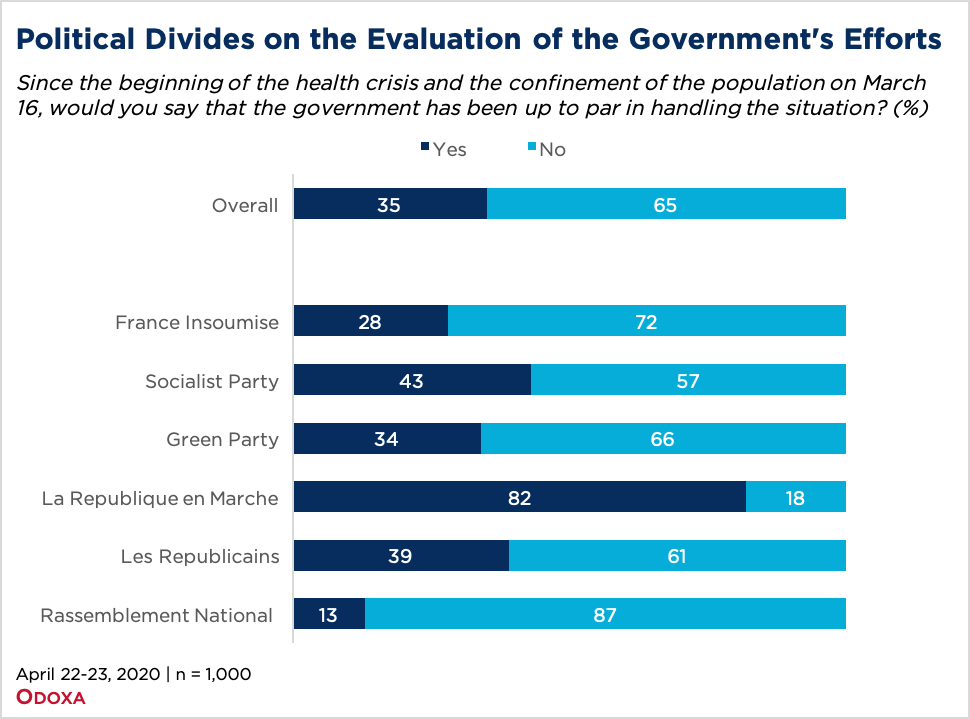
The French public expresses significant support for making antibody tests available at pharmacies. In particular, respondents say rapid antibody tests at pharmacies are a good idea because they are present throughout France and easily accessible (94%), because pharmacists are competent health professionals (92%), and because that would avoid overloading laboratories and doctors after the deconfinement (92%). Eight in ten (82%) say that such testing will be an asset in allowing France to succeed in its deconfinement.
Despite low confidence in the government’s plans to ease the national lockdown, both President Emmanuel Macron and Prime Minister Edouard Phillipe are seeing their highest approval ratings in two years (42% and 46% respectively). Since February, Macron’s approval rating has jumped 9 points and Phillipe’s has jumped 11 points. Approval ratings for were in the 30-36% range since September 2018.
United Kingdom
In Boris Johnson's first public appearance since he contracted the coronavirus, he advocated for continued adherence to the lockdown restrictions due to "real signs" that they are "passing through the peak." These comments come as the UK sees lower hospital admissions and fewer intensive care patients. Infections and deaths are currently around 153,000 and 21,000, respectively. However, asked in an Ipsos poll conducted April 17-20, 51 percent of Britons say they are fairly or very unlikely to wear a facemask in public in the near future. But if it is explicitly recommended by the government, 74 percent say they are very or fairly likely to wear a facemask.
Meanwhile, Downing Street is beginning to roll out state-backed loans for small businesses which will be exempt from interest for the first 12 months. A survey of British businesses by the British Chamber of Commerce found that 71 percent of firms have furloughed at least some staff and 30 percent of firms have furloughed between 75 and 100 percent of their workforce.
Despite the government's efforts to ease the economic impact of the outbreak and urge compliance with restrictions, an Observer poll conducted April 21-23 found that public confidence in the government's handling of the virus has fallen for two straight weeks; 51 percent of the public approves of government efforts, down from 61 percent two weeks prior. Moreover, 63 percent think that the government did not act fast enough to contain the spread of the virus, up from 57 percent two weeks prior.
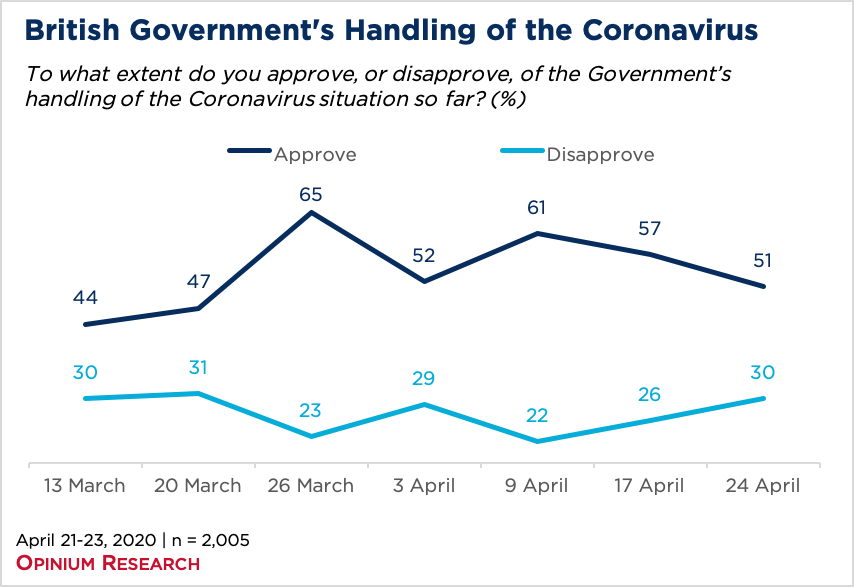
Asia
South Korea
Rumors—and they are just rumors—of Kim Jong Un's health have overshadowed the continuing success of South Korea in battling COVID-19 this week. While there are nearly 11,000 cases in the country, with 244 deaths, newly reported cases each day have often been in the single digits. This success continues to build political capital for Moon Jae-in.
While Moon’s approval rate stood at 42 percent in Gallup Korea polling in late February, those numbers have risen every week and now stand at 62 percent. The data provides hints as to why this has been such a boon to his presidency. Concern about coronavirus is down, approaching levels not seen since before the major outbreak in Daegu—home to the largest outbreak outside China in late February. Now, 60 percent say they are concerned about the virus, down from 68 percent last week, with more saying they are not very concerned (28%) than there are who say they are very concerned (21%). As the number of newly reported cases remains low, life is returning to something resembling normal. South Korea may not have turned the corner, but it seems to be peeking around it.
Gulf States
Saudi Arabia and the United Arab Emirates
In Saudi Arabia and the United Arab Emirates (UAE), respondents are similarly concerned about the coronavirus pandemic. Six in ten Emiratis (60%) and Saudis (59%) are concerned that a loved one will get sick as a result of the virus, and roughly half in the UAE (52%) and Saudi Arabia (49%) are concerned they will get sick themselves. And with both countries still imposing a limited curfew to prevent the spread of the disease, four in ten Emiratis (41%) and Saudis (41%) are concerned about the isolation brought on by such measures.
Saudis' and Emirati's concern about the economic impact of the coronavirus is rising, but not equally. A YouGov survey conducted between April 8-15 finds two-thirds of Emiratis (64%) and four in ten Saudis (38%) are concerned about losing their job or salaries as a result of the coronavirus pandemic. Emiratis are also more worried about the global economic impact of the virus (56%, compared to 43% of Saudis) and potential financial losses (48%, compared to 32% of Saudis).
While the GCC states have not released official data on infected individuals, anecdotal evidence suggests that the virus is spreading rapidly through the Gulf's foreign labor populations. In addition to these health concerns, many migrant workers have been fired or furloughed without pay and are unable to return to their home countries due to travel restrictions.
In the UAE and Saudi Arabia concern is highest among expatriates. In the UAE, 74 percent of Western expats and 68 percent of Asian expats say they are worried about job loss, compared to 46 percent of Emirati citizens. In Saudi Arabia, 56 percent of expats say job loss is a top concern, compared to 30 percent of Saudi citizens.







